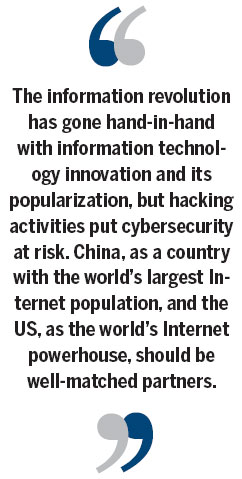Pointing fingers helps neither side
Updated: 2013-03-01 09:15
By Tang Lan (China Daily)
|
|||||||||||

US and China should engage in a sustained dialogue on cyberspace issues to dispel mutual suspicions
China has been tagged as a country engaging in cyber espionage, following the release of a report by the US-based cybersecurity company Mandiant that accused the Chinese military of hacking US computer systems.
US House Intelligence Committee Chair Mike Rogers said during a TV program that it was "beyond a shadow of a doubt" that the Chinese government is behind the "unprecedented" cyberattacks against the US, and he accused China of using "its military and intelligence structure to steal intellectual property from American businesses".
It should come as no surprise that the US is accusing China of the cyberattacks, since it has been targeting China on a wide range of issues over recent years. The latest accusation has overshadowed Sino-US cooperation on cybersecurity.
The Cold War mindset that prevails in the US and the US' overestimating of China's cyber capabilities are hindering progress in cybersecurity cooperation.
On one hand, the US clings to its long-held friend-or-foe mindset despite the changing global landscape. The US is, without a shadow of a doubt, uncomfortable and even uneasy about China's rise, and it is in a dilemma over whether to engage or contain it.
The US still can't decide whether China is friend or foe, but as the world's sole superpower it simply cannot accept the possibility that it might be challenged or even overtaken by another country. In a bid to maintain US-helmed global hegemony, Washington usually aims at a certain target citing security concerns and then builds up and flexes its military muscles.
It also applies this strategy to cyberspace. It has adopted an aggressive policy toward cyberspace and is beefing up its capabilities to both defend itself from cyberattacks and launch its own cyberattacks.
US cyberexperts are concerned that China is now neck and neck with the US in terms of their cyberwarfare capabilities and is a threat to the US' national security.
However, they have miscalculated China's cybercapabilities with or without intention. China has expanded its influence in the cybersphere in recent years, thanks to its rising number of Internet users and the rapid expansion of the Internet, but it still lags well behind the US.
Nonetheless, the truth is China's Internet uses are still in its primary stage. The general opinion shared among Chinese Internet experts is that the country's cyber capabilities have grown fast but they are still not strong enough, especially considering that the core technologies come from the US.
In fact, China is the main victim of cyberattacks. About 73,000 overseas IP addresses controlled more than 14 million computers in China last year, according to a report released by China's primary computer security monitoring network, the National Computer Network Emergency Response Coordination Center of China. Technologies in chip, processing system, router, database and underlying security are all controlled by the US.
The information revolution has gone hand-in-hand with information technology innovation and its popularization, but hacking activities put cybersecurity at risk. China, as a country with the world's largest Internet population, and the US, as the world's Internet powerhouse, should be well-matched partners.
Hillary Clinton, former US secretary of state, even said last year during the fourth round of the China-US Strategic and Economic Dialogue that, "as two of the world's largest cyberactors, it is vital for the United States and China to have a sustained, meaningful dialogue on cyberspace issues and work together to develop a shared understanding of acceptable norms of behavior".
The US' concern over China's growing cyber capabilities is understandable, but it should not mistake China's own need for cybersecurity as a threat. When it comes to cybersecurity, the two countries should promote greater cooperation instead of pointing a finger at each other.
The author is deputy director of the Institute of Information and Social Development Studies at the China Institutes of Contemporary International Relations. The views do not necessarily reflect those of China Daily.
(China Daily 03/01/2013 page10)
Today's Top News
List of approved GM food clarified
ID checks for express deliveries in Guangdong
Govt to expand elderly care
University asks freshmen to sign suicide disclaimer
Tibet gears up for new climbing season
Media asked to promote Sino-Indian ties
Shots fired at Washington Navy Yard
Minimum growth rate set at 7%
Hot Topics
Lunar probe , China growth forecasts, Emission rules get tougher, China seen through 'colored lens', International board,
Editor's Picks

|

|

|

|

|

|





